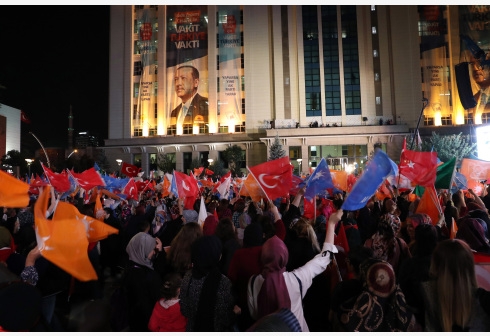


|
 |
|
The ruling Justice and Development
Party (AKP) now has to continue its coalition with the Nationalist Movement
Party (MHP), which has become a key player in the parliament, experts said.
"To carry out legislative
work, the AKP now needs the support of its electoral ally, the MHP. That is
the beginning of a period in which the MHP leader Devlet Bahceli will have a
greater impact on Turkish politics," said Sedat Ergin, Hurriyet Daily
commentator.
In the parliament polls, votes for
Erdogan's party decreased to 42.4 percent, which means the AKP is expected to
have 293 out of the 600 parliamentary seats, while the MHP is expected to
have 50 seats with 11.1 percent of votes.
Erdogan has won nearly a dozen
elections and dominated Turkish politics since his party first came to power
in 2002. He won the presidential elections in the first round by gaining 52.5
percent of votes, but support for his party decreased by 7.1 percent from the
2015 elections.
Unofficial results showed five
parties have passed the 10-percent election threshold required to secure a
seat in the parliament.
The AKP and MHP have been in
alliance since a crucial referendum in April 2017 to decide on the transfer
from a parliamentary system to an executive presidential one.
The two parties have also
established "People's Alliance" for the elections on Sunday, June
24.
MHP leader Bahceli was the first
political leader who suggested to hold snap elections ahead of the originally
scheduled time November 2019.
"The biggest surprise that
came out of these elections is how the MHP managed to secure the majority of
its vote share, despite all speculations and internal divisions," Ergin
said, because the MHP was expected to get less than 10 percent of votes after
dissents established IYI (Good) Party.
In his first statement, Bahceli
said people gave his party a duty of both being a "key and check-balance".
"The MHP can be the key party
or locking party at the parliament. Now there is a very sensitive balance at
the parliament," said Okan Muderrisoglu, a columnist with the daily
Sabah.
Bahceli's statement indicates that
his party would assume a balancing role at the parliament, rather than being
a part of the government, he noted.
The Kurdish issue-focused Peoples'
Democratic Party (HDP) also achieved a success on Sunday by gaining over 10
percent of votes, despite that its presidential candidate Selahattin Demirtas
was in jail, Ergin noted.
|
Source: NDO